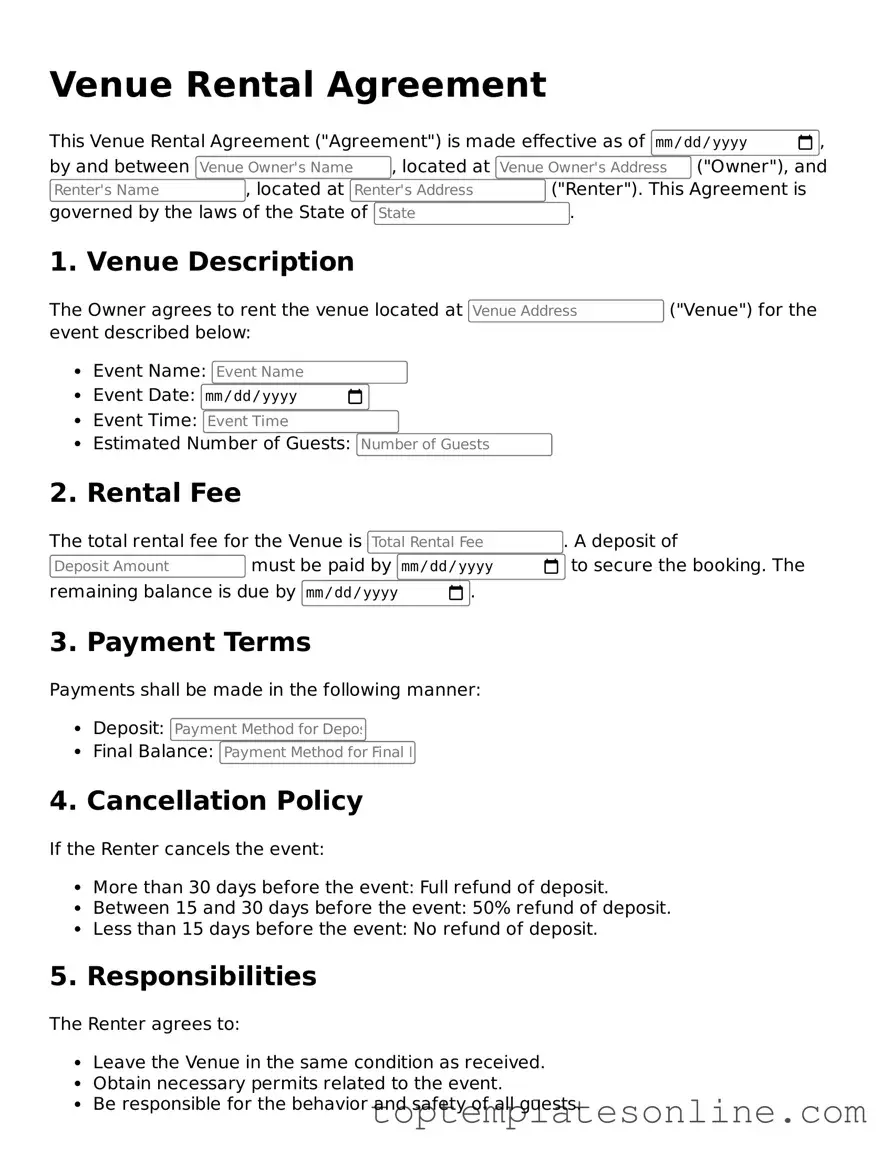Attorney-Approved Venue Rental Agreement Form
When planning an event, securing the right venue is crucial to its success, and a Venue Rental Agreement serves as a foundational document in this process. This form outlines the terms and conditions under which a space can be rented, ensuring that both the venue owner and the renter understand their rights and responsibilities. Key elements typically include the rental period, payment details, and any deposits required. Additionally, the agreement often specifies the permitted uses of the venue, restrictions on activities, and provisions for liability and insurance. It may also address issues such as cancellation policies, maintenance responsibilities, and rules regarding noise levels or decorations. By clearly delineating these aspects, the Venue Rental Agreement helps to prevent misunderstandings and provides a framework for a successful event. Understanding this document is essential for anyone involved in event planning, as it not only protects the interests of both parties but also fosters a positive relationship between venue owners and renters.
Find More Types of Venue Rental Agreement Templates
Wedding Venue Contract Example - The form provides information on available date options for the venue.
Garage for Lease - Establishes responsibilities for utilities or services related to the garage.
For those entering into rental agreements, understanding the nuances of the New York Lease Agreement form is vital. This document ensures all parties are aware of their obligations and rights. For a more in-depth look, consider our guide on how to navigate the Lease Agreement process effectively at exploring the Lease Agreement essentials.
Parking Space Template - This form may include requirements for notice before lease termination.
Common mistakes
-
Overlooking Important Details: Many people rush through the Venue Rental Agreement form and miss crucial details. Always read the entire document carefully. Pay attention to the rental dates, times, and any specific requirements the venue may have.
-
Failing to Specify the Purpose: It's essential to clearly state the purpose of your event. Whether it’s a wedding, corporate meeting, or birthday party, specifying this helps the venue understand your needs and ensures compliance with their policies.
-
Ignoring Cancellation Policies: Many renters neglect to review the cancellation policy. Understanding the terms regarding cancellations or changes can save you from unexpected fees or loss of your deposit.
-
Not Including All Necessary Signatures: Some individuals forget to sign the agreement or overlook the need for additional signatures from co-organizers or sponsors. Ensure that everyone involved in the event is on the same page and has signed where required.
-
Misunderstanding Payment Terms: Payment terms can be confusing. Be clear about the total cost, deposit requirements, and payment deadlines. Misunderstanding these terms can lead to financial complications down the line.
Guide to Writing Venue Rental Agreement
Completing the Venue Rental Agreement form is a straightforward process. Following these steps will help ensure that all necessary information is accurately provided, allowing for a smooth rental experience.
- Begin by entering the date of the agreement at the top of the form.
- Provide your full name and contact information in the designated sections.
- Fill in the name and address of the venue you wish to rent.
- Specify the date and time of the event you are planning.
- Indicate the type of event you will be hosting.
- Detail the number of guests expected to attend.
- Review the rental fees and any additional costs outlined in the agreement.
- Sign and date the form at the bottom to confirm your acceptance of the terms.
After completing the form, you will typically need to submit it along with any required deposit or payment. This ensures that your reservation is secured and the venue is prepared for your event.
Documents used along the form
When renting a venue, several additional documents may be required to ensure a smooth process and clear communication between all parties involved. Below are some common forms that often accompany a Venue Rental Agreement.
- Event Schedule: This document outlines the timeline of the event, including setup and breakdown times. It helps both the venue and the renter coordinate activities efficiently.
- Lease Agreement: Understanding the califroniatemplates.com Lease Agreement form is crucial as it defines the conditions between landlords and tenants, ensuring clarity and protection for both parties involved in the rental process.
- Insurance Certificate: Proof of insurance coverage is often necessary to protect both the venue and the renter from potential liabilities. This document confirms that adequate insurance is in place.
- Payment Receipt: This serves as a record of any payments made towards the rental agreement. It is essential for both parties to keep track of financial transactions.
- Rules and Regulations: This document details the venue's policies, including noise restrictions, capacity limits, and other important guidelines. Familiarity with these rules helps ensure compliance during the event.
Having these documents prepared and understood can facilitate a positive experience for everyone involved in the venue rental process. Clear communication and proper documentation are key to a successful event.
